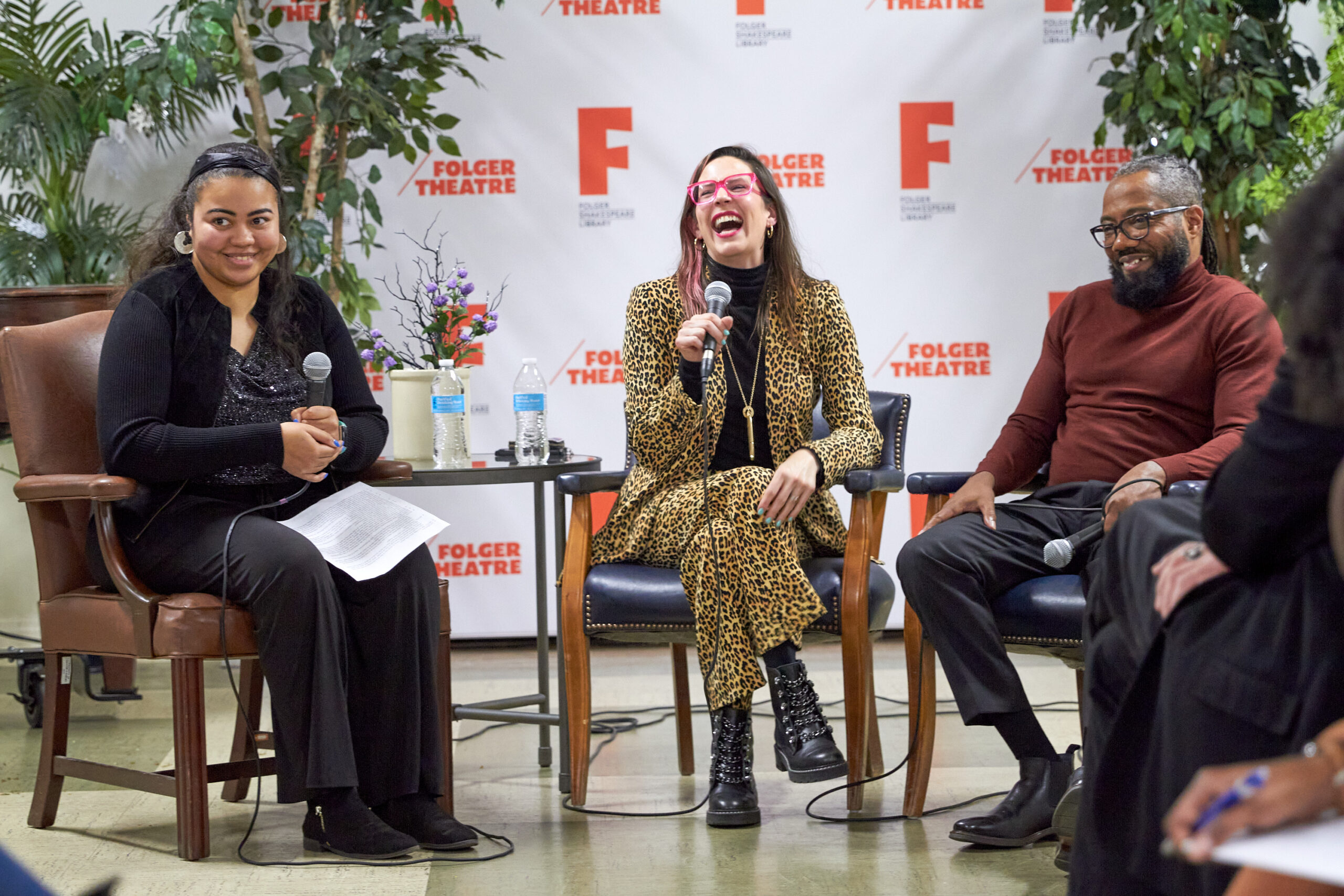From Jan. 25 through 28, one D.C. theatre bearing a striking resemblance to Shakespeare’s Globe Theatre presented four shows inspired by the Bard’s works.
Hosted by the Folger Shakespeare Library, The Reading Room Festival offered a variety of talks and events over the course of four days, with each day headlined by a new show. The featured performances—Rap Monologues, The Cuban Vote, How Shakespeare Saved My Life, and Everything That Never Happened—each critiqued or celebrated elements of Shakespeare’s texts.
–
Rap Monologues
On the festival’s opening night, Austin Dean Ashford’s one-man show, Rap Monologues, commanded the Folger stage.
Rap Monologues tells the story of Lamar, a man who works at Safe Guys—a UHaul type store—but dreams of becoming a famous actor. After Liz, the director of the local theater, encourages him to audition for a production of Titus Andronicus and tells him he is expected to audition with a “classical text,” Lamar, unfamiliar with Shakespeare’s works, decides to present a monologue using the material that he considers classic: rap.
Through his passionate transformation of rap lyrics into emotional monologues—supplemented by Lamar’s humorous, if flawed, estimation of a British accent—Ashford shows how hip hop and Shakespeare aren’t as different as one might expect. His performance redefines “classic,” showing how the same themes, explored in eloquent prose, can be found in both Shakespeare’s 16th-century theater and contemporary hip hop.
The theater director rejects Lamar’s audition after she learns he is performing a monologue of rap, not Shakespeare, but Lamar, unbowed, decides to pursue his new discovery. He performs for his coworkers and dreams of putting on a full show for his community at the store. As he attempts to convince his boss, Mr. Harris, Lamar simultaneously argues his case to the audience.
Ashford’s portrayal of the cast of characters was sublime. He employed different voices, gestures, and mannerisms for Lamar, Mr. Harris, Liz, and Monica (a coworker who, delighted by Lamar’s plan, performs a rap monologue of her own), giving each a distinct characterization. In the moments of rapid-fire dialogue between two characters, he seamlessly transitioned from one to another. Ashford also played with the fourth wall, incorporating the audience into the show as the role of Safe Guy’s new hires—whom he lovingly calls “pookies”—and at times, going into the audience to test their knowledge of whether a lyric is from a rap song or a Shakespearean play.
Rap Monologues asks its audience to reconsider the historical restrictiveness of the title “classic” and broaden its application to other art forms and styles, while simultaneously reaffirming that the theater is a space for everyone and all genres of expression. “Hip hop is Afrofuturism,” Lamar proclaims: the future of theater.
The Cuban Vote
Marrying a controversial Shakespearean comedy with the charged energy of a political campaign, Carmen Pelaez’s The Cuban Vote made its D.C. debut at the festival to raucous laughter. Drawing inspiration from Shakespeare’s The Taming of the Shrew, the show transposes the play’s original setting of 16th-century Italy to modern day Miami-Dade county and attentively irons out the play’s controversial misogynistic elements.
The Cuban Vote reimagines the spinster Katherina as Carolina (Pelaez), the daughter of the former mayor and current mayoral candidate, whose political acumen and ambitions for transforming her city are matched only by her failure to be “likable.” Alex (Gabriel Alejandro), a hotshot political consultant who returns to his hometown from D.C., is this play’s Petruchio. Whereas Petruchio in The Taming of the Shrew employs abusive measures to “tame” Katherina, in The Cuban Vote, Alex genuinely respects Carolina and takes on her campaign because he believes she can win.
Alex manipulates Gilberto (Jonathan Nichols-Navarro), the local drunk, into believing he is a self-made millionaire Cuban refugee, and convinces him to run for mayor in hopes that the lunacy of his campaign will put Carolina in a better light. Gilberto eagerly accepts Alex’s lies—glued together with an amnesia story that would falter in a serious drama, but fits well within the comedy—and becomes the condescendingly sexist, staunchly anti-communist candidate. As the campaign continues, however, the former drunk inexplicably gains followers. Though the words “democrat” and “republican” are never used, ties to our polarized political landscape in the U.S. are readily apparent: Gilberto labels Carolina as “socialista,” and Alex insists that she should shy away from mentioning “climate change” and use the more palatable “changes in climate.”
The play is informed by Pelaez’s experience as a political consultant in South Florida. It tackles complex topics like the sexism women face in political races, the manipulation of trauma in the Cuban-American community by political candidates, and the intricacies of Miami politics with the grace and expertise of someone who knows it well.
Pelaez’s love for her home city shines through in both the script, filled with nods to Miami’s Cuban community. In her performance as Carolina, she depicts a profound love for the city, yet also expresses frustration at the community’s refusal to see how she could help them as mayor.
The rest of the cast shines as well. Nichols-Navarro brings a gleeful, clown-king energy to the charming dark horse political candidate, commanding the stage and devouring any and all attention he receives. Alejandro plays Alex with a suave self-assurance that flickers during moments of refreshing vulnerability, such as when he opens up to Carolina about his working class background and motivation behind becoming a political consultant.
With its snappy dialogue and compelling, character-driven plot, The Cuban Vote remained engrossing until the very end. The play’s conclusion not only features a humorous fake out in which the audience, initially made to believe Gilberto has won, is treated to another level of his laughable delusion as he announces his run for Congress in his concession speech, but also returns to its Shakespearean roots by pairing up the feuding lovers. This time, however, their love is not a forced fabrication, but rooted in mutual respect.
How Shakespeare Saved My Life
The festival’s third show was not a work of fiction, but rather, a profoundly personal “epic poem” performed by actor Jacob Ming-Trent about his deep passion and appreciation for Shakespeare.
“Growing up in America was a dangerous mission,” Ming-Trent says early on. How Shakespeare Saved My Life touches upon the challenges of growing up as a Black man in the United States as well as his familial struggles, namely his mother’s untreated mental illness and his father’s drug addiction after returning home from the Vietnam War.
Ming-Trent unintentionally discovered Shakespeare after walking into the wrong classroom at age 12, where he stumbled upon a student performing a monologue. Invited by that class’s teacher to try his hand at reading the St. Crispin’s Day speech from Henry V, he became enchanted by the language and has continued seeking out Shakespeare’s work and etching his poetry into his brain ever since. Beyond simply enjoying the beauty of the Bard’s works, Ming-Trent also noticed how white peers looked differently at him when he recited Shakespeare, as if he had proven his admission to an elite club.
At age 17, feeling that his time in the classroom wasn’t preparing him for the real world, Ming-Trent dropped out of high school and moved to New York to follow his dream of becoming a Shakespearean actor. Although his talent got him a spot in a prestigious acting academy, he was discouraged from pursuing Shakespearean acting by his teachers because of his race. Disillusioned with casting directors, Ming-Trent moved to LA and acted in TV shows before returning to the New York theater scene.
While chronicling his personal narrative and sprinkling in anecdotal life lessons explained through Shakespeare’s own words, Ming-Trent showcased both his passion for the text and his well-honed acting craft. He performed with a storyteller’s gravitas but remained personable, as if he was having a chat with the audience.
Ming-Trent was not alone onstage. Accompanied by musicians Jae Anthonee, Asia Jones, and Jason Wilson on piano, drums, and bass, respectively, he cast Shakespeare’s writing in a new light, setting various monologues and sonnets (such as Edmund’s “base” soliloquy in King Lear and Sonnet 130) to music. Although the ensemble had been put together quickly—the final member joining in earlier that week—the trio performed sublimely together, each instrument supplementing the sound of the other as if this was far from their first show.
In the play’s conclusion, Ming-Trent notes that the word “love” is used ten times more than the word “hate” across all of Shakespeare’s works and extrapolates that there is a larger lesson to be gleaned by examining the Bard’s persistent centering of love within his catalog. Ming-Trent ends his performance by launching into a poem where he declares his forgiveness for America and all its sins. This closure to his show demonstrated Shakespeare’s deep influence on Ming-Trent’s life as despite the challenges and obstacles he has faced, he decided not to embark on a revenge tragedy of his own, but rather to pursue a path of forgiveness.
Everything That Never Happened
The festival’s final play, Everything That Never Happened, recenters and recontextualizes Shakespeare’s The Merchant of Venice, turning the antisemitic comedy into a nuanced tragedy.
Written by Sarah Mantell, the play explores what happens in the cracks of Shakespeare’s The Merchant of Venice, an infamously antisemitic play that relies on stereotypes to define the play’s villain, Shylock, and ends with the play’s Christian protagonists outsmarting him and forcing him to convert to Christianity. Mantell, who is Jewish and spent years avoiding Merchant, wrote the play in an attempt to replace it with a story that did not rely on antisemitic tropes.
The play begins lighthearted and sweet, with a scene that could be taken out of one of Shakespeare’s comedies: the lovers Jessica (Miriam Schwartz) and Lorenzo (Zack Powell) meeting in secret. However, this jovial beginning descends into a deeper, darker space as every crucial plot line from Merchant, even Jessica and Lorenzo’s frenzied love for one another, is thrown into doubt.
Everything That Never Happened follows Jessica’s plan to elope with her Christian lover Lorenzo, a plan motivated by her desire to live free from the restrictions Venice places on its Jewish population. To do so, she must convince her father, Shylock (Derek Kolluri) to give a loan to Antonio—Merchant’s protagonist who notably never appears in this production—so that he will leave the house and give her the chance to run away. By convincing her father to give the loan, Jessica inadvertently sets the events of The Merchant of Venice in motion. The story may be a comedy for the play’s Christian protagonists, but it’s a tragedy for the Jewish Shylock—and, as Everything That Never Happened suggests, for Jessica as well.
Through their adroit reworking of Merchant, Mantell makes it clear that the true villain of both plays is antisemitism. The stringent restrictions on Jews in 16th-century Venice become apparent from the very beginning when a lighthearted scene between Jessica and Lorenzo takes a turn after she admits to him that she lives in the Jewish ghetto.
The play also offers a powerful meditation on the history of Jewish pogroms. After learning that her father has stipulated Antonio give him a pound of his own flesh if he defaults on his loan, Jessica worries his demand will be used to vilify him and fuel anti-Jewish stereotypes. She recites with increasing fear the dates and locations of Jewish pogroms. After first breaking the play’s fourth wall by naming pogroms that were yet to happen, the list then expands to include places and dates that extend past 2024. This powerful moment highlights that violence fueled by antisemitism is not merely confined to the past. A recurring line from earlier in the play that prompted chuckled upon its first mention—“This is Venice in 1596”—now becomes chilling as she implies that this time and place will go down in history as the date of another lynching.
Mantell’s powerful script is elevated by Everything’s commendable ensemble who expertly embodied their characters’ desires and frustrations.
Compared to his gruffer, vilified characterization in Shakespeare’s original text, Kolluri’s Shylock has an endearing awkwardness. He is painfully aware of the antisemitism that pervades Venetian society and controls his movements and professional options. When his anger makes an appearance, it is in response to that pervasive antisemitism and Jessica’s betrayal.
Shakespeare’s Merchant further tarnishes Shylock’s character by having Jessica dislike him and seek to escape his home. However, Schwartz’s Jessica clearly loves her father, and her desire for freedom is not driven by her father’s tyranny, but instead by the restrictions Venice puts on its Jewish population. She plays the character with a headstrong assuredness slightly tempered by the societal restrictions she lives under.
Powell plays Lorenzo with an idealistic, lovestruck lightness that later darkens when Jessica questions whether he truly loves her or simply married her for her money. In the moments where his love for Jessica is called into question, Powell infuses his lines with a dangerous desperation. While his love for her was initially obvious, it later turns ambiguous when it is revealed that he owes a debt to her father, which he will be free from by running away with Jessica, putting Jessica and Lorenzo’s apparent happy ending in Merchant into question.
The other character pining for Jessica’s affection, her Christian servant Gabbo (Cali Izzi), aids her with a lovelorn devotion that she does not recognize until too late. The directing staff’s choice to cast a transmasc actor and reframe Gabbo too as transmasc provides hope for a more accepting society while simultaneously exposing the issues Venice still has to face. No one criticizes or comments on Gabbo’s identity, accepting him for who he is, a response that stands in contrast to the religious bigotry permeating their society.
Through their masterful reworking of The Merchant of Venice, Mantell’s reframing of Shakespeare’s original antisemetic ending proves the importance of reclaiming and reinterrogating texts that promote harmful stereotypes.
—
At Folger Theatre’s Reading Room Festival, each playwright revealed how Shakespeare’s work remains ever-salient. Each night’s reading, though performed behind music stands with few props or sets, captivated the audience with engrossing scripts and passionate performances. Occasional flubbed lines may have arisen in every show, but each actor’s seamless return to the script emphasized their commendable skill.
Many of the shows are still in development and are likely to see new changes in the coming months. In post-show discussions, the playwrights all expressed hope for the future of their plays. With Shakespeare himself taking inspiration from other works such as The Tragical History of Romeus and Juliet (Romeo and Juliet) and True Chronicle History of King Leir (King Lear) for many of his plays, witnessing evening after evening of Shakespeare-inspired shows feels like a perfect full-circle moment to the tradition of playwrights inspiring playwrights.





